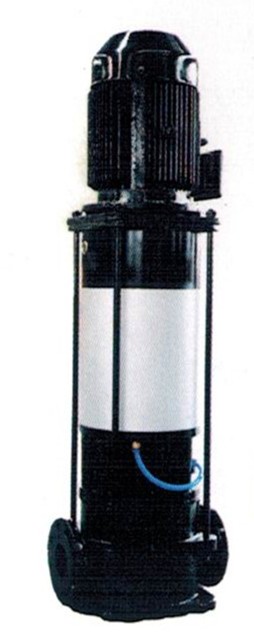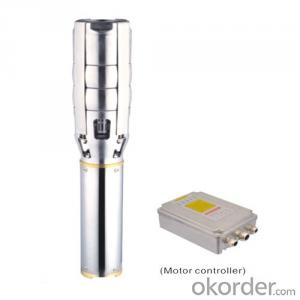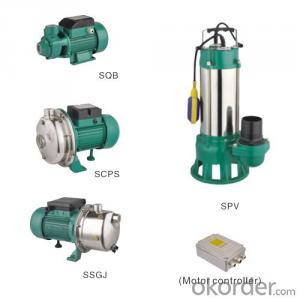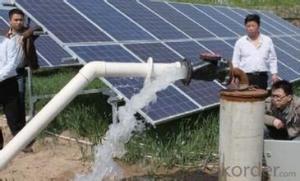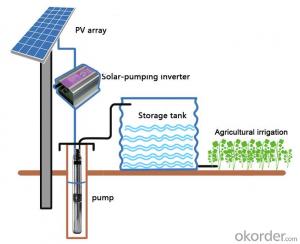Aquajet Solar Water Pump L3D-20-80
- Loading Port:
- China Main Port
- Payment Terms:
- TT OR LC
- Min Order Qty:
- -
- Supply Capability:
- 300 sets /month
OKorder Service Pledge
OKorder Financial Service
You Might Also Like
Product description:
Product: Solar water pump
Model:L3D-20-80
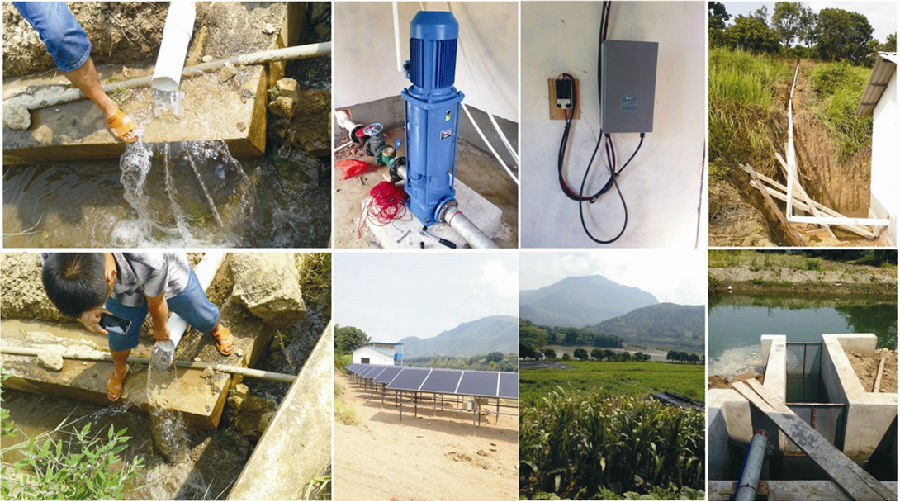
Appilication:
surface pump
for surface water of pond, river, lake
for irrigation of a big farm with 12000 m2 on the top of a small hill
Product specification:
flow rate:20m3/ hour, 160m3/day.
lift: 10m-80m
pump diameter: 296mm
Pump installed on the ground, outlet to the water surface:4m
with AC motor, motor power:5.5kW
but only need solar power:3.2kW(while Grundfos pump needs at least 11.5kW solar power, our pump can save more than 50% solar panel power,save USD3600 cost for solar panel per set.
Material:
Pump inside: stainless steel and wearable nylon,it enables our solar pump to have 10 years sevice life.
Motor : AC motor, 380V , three phase , 50Hz. The pump also can connect with grid power directly.
Certification:
3 International patent
ISO9001
CE
Warranty:2 years
- Q: How does a solar pump help in reducing the use of pesticides?
- A solar pump aids in reducing the use of pesticides by providing a reliable and sustainable source of water for irrigation. With consistent access to water, farmers can implement more efficient watering techniques, such as drip irrigation, which targets the roots of plants. This reduces the amount of water wasted and minimizes the spread of pests and diseases that thrive in moist conditions. Additionally, solar pumps can power irrigation systems that spray pesticides directly on the plants, ensuring targeted application and minimizing the need for broad-spectrum spraying.
- Q: Can a solar pump be used for wastewater recycling?
- Yes, a solar pump can be used for wastewater recycling. Solar-powered pumps are an eco-friendly and cost-effective solution for pumping and treating wastewater. They can efficiently move the water from one location to another, facilitating the recycling process. Additionally, solar pumps eliminate the need for electricity, reducing the operating costs and environmental impact associated with traditional pumps.
- Q: How does a solar pump help in reducing the use of chemical pesticides?
- A solar pump helps in reducing the use of chemical pesticides by providing a sustainable and eco-friendly alternative for irrigation. By utilizing solar energy, the pump powers the irrigation system, ensuring a consistent and reliable water supply for crops. This helps in maintaining optimal soil moisture levels, reducing the risk of pests and diseases. Additionally, solar pumps can be combined with drip irrigation systems, which deliver water directly to the plant's root zone, minimizing water wastage and preventing the spread of pests and diseases that often thrive in moist conditions. The reduced reliance on chemical pesticides not only promotes healthier and more sustainable farming practices but also contributes to a cleaner environment.
- Q: Can a solar pump be used for domestic purposes?
- Yes, a solar pump can be used for domestic purposes. Solar pumps are designed to draw water from a source, such as a well or a reservoir, using energy from the sun. They can be used to supply water for various domestic needs, including irrigation, livestock watering, and household water supply. Solar pumps offer a sustainable and cost-effective solution for meeting domestic water requirements in areas with limited or no access to grid electricity.
- Q: Can a solar pump be used for water supply in off-grid fish farms?
- Certainly, off-grid fish farms can utilize solar pumps for their water supply. Solar pumps prove to be an exceptional and sustainable option for delivering water to fish farms situated in remote areas where access to grid electricity is unavailable. These pumps are driven by solar energy, eliminating the need for any external power source or fuel, making them both economical and eco-friendly. Solar pumps can effectively extract water from sources like rivers, lakes, or boreholes and transport it to the fish ponds or tanks. They can be designed to provide a steady flow of water, ensuring that the fish receive an ample supply for their growth and well-being. The utilization of solar pumps in off-grid fish farms presents several advantages. Firstly, it reduces reliance on expensive and unreliable fossil fuels and grid electricity, particularly in secluded locations. Solar pumps operate by harnessing the abundant and renewable power of sunlight, offering a sustainable solution for long-term water supply. Moreover, solar pumps necessitate minimal maintenance as they possess fewer moving parts compared to conventional pumps. This reduces the risk of mechanical failures and the frequency of repairs, leading to decreased operational costs and heightened efficiency. Furthermore, integrating solar pumps into existing fish farm infrastructure requires minimal modifications. They are available in various sizes and capacities, enabling customization based on the specific water requirements of the fish farm. In conclusion, the usage of a solar pump is indeed feasible for water supply in off-grid fish farms. It provides a dependable, cost-effective, and environmentally friendly solution, ensuring a continuous and sustainable water supply to support the growth and health of fish in remote locations.
- Q: Can a solar pump be used for pool heating?
- Yes, a solar pump can be used for pool heating. Solar pumps are designed to circulate water using energy from the sun, making them an environmentally friendly and cost-effective option for pool heating. The solar pump works by capturing the heat from the sun and transferring it to the pool water as it circulates through the pump. This process helps to increase the temperature of the pool water, providing a comfortable swimming experience even during cooler months. Additionally, solar pumps require little to no maintenance and have a long lifespan, making them a popular choice for pool owners who want to reduce their energy consumption and save on heating costs.
- Q: What is the impact of a solar pump on groundwater levels?
- A solar pump has a positive impact on groundwater levels as it utilizes solar energy to extract water from underground sources. This sustainable alternative to traditional pumps reduces reliance on fossil fuels and minimizes environmental impact. By efficiently extracting water, it helps maintain or replenish groundwater levels, contributing to the overall conservation and sustainability of water resources.
- Q: What is the impact of a solar pump on poverty alleviation?
- A solar pump has a significant impact on poverty alleviation. By providing clean and reliable access to water for irrigation, it enables smallholder farmers to increase their agricultural productivity and income. This helps lift them out of poverty by reducing their dependency on rain-fed agriculture and increasing food security. Additionally, solar pumps eliminate the need for expensive diesel or electricity-powered pumps, reducing operational costs and making them more affordable for farmers in remote and off-grid areas. Overall, the use of solar pumps contributes to improved livelihoods, economic growth, and reduced poverty in rural communities.
- Q: Can solar pumps be used for water supply in wildlife conservation or rehabilitation projects?
- Yes, solar pumps can be used for water supply in wildlife conservation or rehabilitation projects. Solar pumps rely on sunlight to generate power and do not require electricity from the grid, making them a sustainable and cost-effective option for providing water to remote areas where wildlife conservation or rehabilitation projects are located. These pumps can help maintain or restore natural water sources, ensuring the availability of clean and safe water for wildlife populations and supporting their overall well-being.
- Q: How do I ensure the durability of the solar pump system in harsh environmental conditions?
- To ensure the durability of a solar pump system in harsh environmental conditions, there are several key measures that can be taken: 1. Selecting the right equipment: Start by choosing a solar pump system that is specifically designed and rated for the specific environmental conditions you will be facing. Look for pumps and panels that have high-quality construction and materials to withstand harsh elements. 2. Proper installation: Ensure that the solar pump system is installed correctly by following the manufacturer's guidelines and recommendations. This includes securing the panels and pump in a stable and protected location, away from potential hazards or extreme weather conditions. 3. Protection from moisture and dust: Harsh environmental conditions often involve moisture and dust, which can damage the system's components. Enclose the pump and control unit in a weatherproof housing or cabinet to protect them from water and dust ingress. Regularly clean and inspect the system to prevent any buildup or damage. 4. Lightning protection: In areas prone to lightning strikes, install lightning arrestors and grounding systems to safeguard the solar pump system. This will help divert any electrical surges away from the system, preventing damage to the panels, pump, and control unit. 5. Regular maintenance: Implement a routine maintenance schedule to ensure the system's optimal functioning and longevity. This includes cleaning the solar panels to maximize energy absorption, checking and tightening connections, inspecting the pump for any signs of wear or damage, and replacing any worn-out components promptly. 6. Monitoring and troubleshooting: Utilize monitoring systems to keep track of the system's performance and identify any potential issues. This will allow for timely troubleshooting and repair, reducing the risk of major failures and improving overall durability. 7. Proper storage during extreme conditions: If the harsh environmental conditions are known in advance, consider storing the solar pump system during periods of extreme weather. This can be done by disassembling and storing the components in a safe and secure location until the conditions improve. By following these measures, you can significantly enhance the durability and reliability of your solar pump system, ensuring it can withstand harsh environmental conditions and continue to operate efficiently for an extended period.
Send your message to us
Aquajet Solar Water Pump L3D-20-80
- Loading Port:
- China Main Port
- Payment Terms:
- TT OR LC
- Min Order Qty:
- -
- Supply Capability:
- 300 sets /month
OKorder Service Pledge
OKorder Financial Service
Similar products
Hot products
Hot Searches
Related keywords

